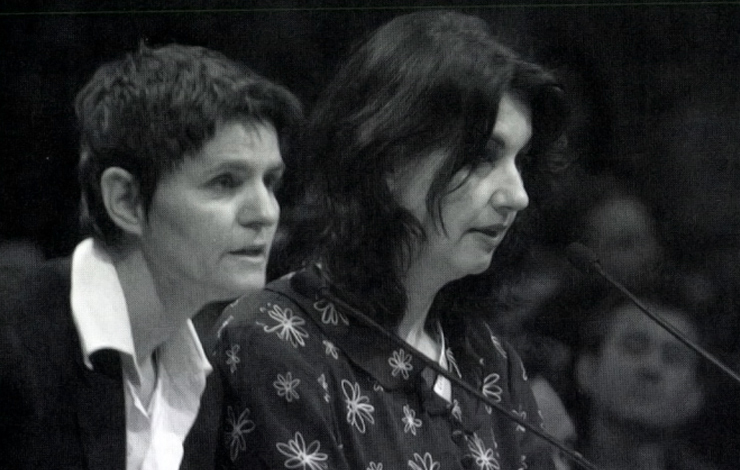
In the aftermath of the one-sided American war coverage in Iraq and the Federal Communications Commission's vote to approve further media consolidation, the Tribute to US Television at the 24th Banff Television Festival last June took on a rather ironic tenor. With the world television market in a relentless slump that continues to drag it downmarket, and the Canadian TV industry in its own state of crisis, this year's festival fell short of a true celebration of the medium's achievements.
Nevertheless, the festival side of Banff featured many outstanding films, with Power Pictures' Chavez—Inside the Coup (which has also screened under the title The Revolution Will Not Be Televised), taking home the top award in the documentary category. On the industry front however, the central preoccupation was The State of Television, a panel series which took an honest look at the crossroads that television programming is currently facing.
"Television is not aiding in the building of a civic society," concluded Peter McGhee during a Master Class at the Banff Centre. "At the moment, television is at a nadir."
In a fitting tribute to some of the good that US programming has contributed to the television industry, McGhee was presented with a special Lifetime Achievement Award. He was honored for having changed the face of American public television by overseeing the creation of rigorous and intelligent nonfiction programs like Frontline, NOVA and American Experience at WGBH.
McGhee's words rang true in the Delegates Lounge, where documentary producers were told to pitch "anything that has sex" to programmers, while next door, filmmakers lamented how media fragmentation and concentration has reduced program diversity.
This recurring paradox underscored the general sense of schizophrenia at the festival and in the industry overall. Nowhere is this being felt more, it seems, than in public television. "There has always been a pull and tug in public television on how to stay relevant and distinctive, but there really needs to be a mission revival now," said Gary Knell, president and chief executive officer of Sesame Workshop, and a leader in US educational programming.
Nevertheless, further down the hall at the Banff Springs Conference Centre, idealism was giving way to pragmatism, as documentary producers vied for the top prize at the Canadian Documart, which offered three cash awards for the "World's Richest Pitch." Projects ranged from a one-off on the experiences of high-school sluts, to a program called Fag Hags, a Will & Grace-cum-documentary that celebrates the "ideal" relationship of the gay man and single woman. Fag Hags took second prize, while a documentary about a Caucasian Statistics Canada employee-turned-folksinger in China won the top prize.
Interestingly, in the downmarket trend of factual programming, some see a silver lining, with uncertain times providing an opportunity for innovation and risk-taking. Jacques Bensimon of the National Film Board of Canada summed it up in Dickensian terms: "Documentary films are going through the best and worst of times."
During a debate on reality television, the BBC's Nick Fraser seemed to concur, disparaging reality television for socializing viewers in terms of fast food TV: "Reality is crowding out documentaries. Viewers want tears; they want back-biting. The expectations are different." At the same time, Fraser acknowledged some of the unexpected consequences of popularizing factual content: "People are saying ‘we are doomed.' I don't agree with that. There is a renaissance in documentaries. There is a huge audience under 30. [Michael Moore's] TV Nation was a brilliant hybrid of reality and factual. Reality is stimulating audiences."
As a result of the successes of Moore's Bowling for Columbine and Jeff Blitz's Spellbound, the BBC, NFB and UK Film Council announced the launch of the World Documentary Fund for the production of feature-length auteur documentaries for theatrical release. The fund is looking to support films that are controversial, and which look at global issues in ironic, subtle and complex ways. It is a hopeful gesture.
Nevertheless, with deregulation well under way in America and elsewhere, the trend will continue towards what Mark Starowicz, director of the CBC/Radio-Canada, described as "the supermarket check-out counter of television."
In Canada, independent producers are fighting back. As part of its 20th anniversary celebrations at Banff, the Documentary Organization of Canada (DOC) called on funding agencies to reverse their recent shift to a ratings-based assessment of films. Moreover, this fall, DOC's British Columbia chapter will play host to a documentary forum called Doc Talk in Vancouver to address the problems of the Canadian television industry in depth. Doc Talk is indicative of the kinds of initiatives being taken by independent filmmakers to ensure that their work remains relevant and meaningful.
"The fascination with markets as the ultimate governor does positive harm," said McGhee. "Corporations have lost any obligation in assisting the public good. I hope it becomes a system that does things that matter. The large shift downmarket may be inevitable but it's regrettable."
Michelle Mason is an independent documentary filmmaker from Vancouver, British Columbia. Her first film, the award-winning The Friendship Village (2002), tells the story of an American veteran who returns to Vietnam to build a reconciliation project for children with Agent Orange-related deformities.
